 Petzlover
Petzlover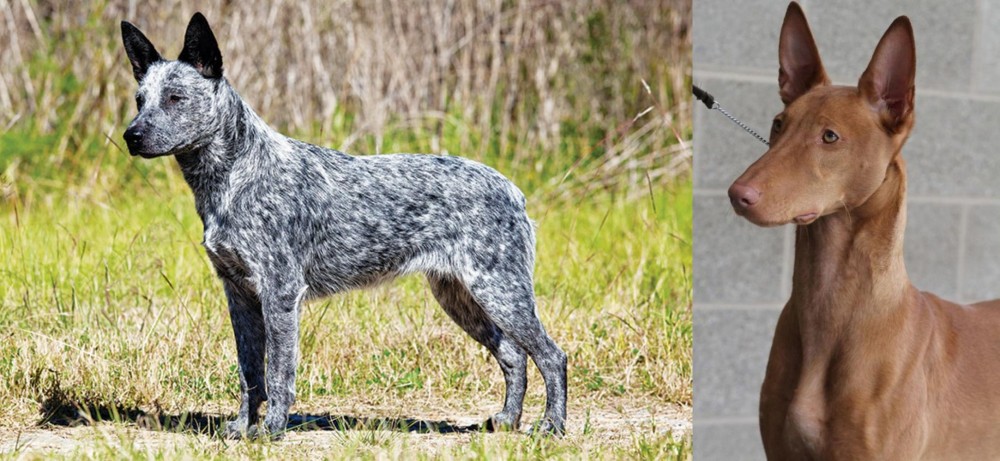 Australian Stumpy Tail Cattle Dog is originated from Australia but Pharaoh Hound is originated from Malta. Australian Stumpy Tail Cattle Dog may grow 12 cm / 4 inches shorter than Pharaoh Hound. Both Australian Stumpy Tail Cattle Dog and Pharaoh Hound are having almost same weight. Both Australian Stumpy Tail Cattle Dog and Pharaoh Hound has almost same life span. Both Australian Stumpy Tail Cattle Dog and Pharaoh Hound has almost same litter size. Australian Stumpy Tail Cattle Dog requires Moderate Maintenance. But Pharaoh Hound requires Low Maintenance
Australian Stumpy Tail Cattle Dog is originated from Australia but Pharaoh Hound is originated from Malta. Australian Stumpy Tail Cattle Dog may grow 12 cm / 4 inches shorter than Pharaoh Hound. Both Australian Stumpy Tail Cattle Dog and Pharaoh Hound are having almost same weight. Both Australian Stumpy Tail Cattle Dog and Pharaoh Hound has almost same life span. Both Australian Stumpy Tail Cattle Dog and Pharaoh Hound has almost same litter size. Australian Stumpy Tail Cattle Dog requires Moderate Maintenance. But Pharaoh Hound requires Low Maintenance
 There is quite a bit of mystery surrounding the origin of the Stumpy Tail Cattle Dog. The breed was developed as a working dog to herd sheep and cattle, but there are quite a few theories about the development of the breed. It is agreed however, that the dog was developed in Australia and came about from crossing the Australian Dingo and British herding dogs.
There is quite a bit of mystery surrounding the origin of the Stumpy Tail Cattle Dog. The breed was developed as a working dog to herd sheep and cattle, but there are quite a few theories about the development of the breed. It is agreed however, that the dog was developed in Australia and came about from crossing the Australian Dingo and British herding dogs.
Perhaps the most popular theory for the origin of the Australian Stumpy Tail Cattle Dog is that the breed was developed by a man named Timmins, sheep drover and a cattle operating in New South Wales during the colonial period. Whatever the dog’s origins, it was in 1996 that the United Kennel Club, the 2nd largest dog registry in the world and the United States, granted full recognition to the Stumpy Tail Cattle Dog as a member of the Herding Group. The breed’s name was changed to the Australian Stumpy Tail Cattle Dog in 2002. Today he remains almost exclusively a tail-less working dog.
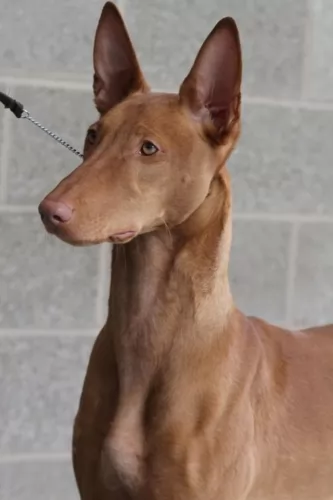 The Pharaoh Hound hails from Malta and is the national dog there. These dogs are rare and are looked upon as endangered. Because they are a primitive type dog, they enjoy good health.
The Pharaoh Hound hails from Malta and is the national dog there. These dogs are rare and are looked upon as endangered. Because they are a primitive type dog, they enjoy good health.
It has always been used as a hunting dog for rabbits. The dog has been recreated from mixing a combination of other breeds. It certainly seems to be an ancient dog breed, having existed for more than 2 000 years.
It is thought that the dog was imported to Malta by Phoenician traders. The dog has been classified as a member of the sighthound group, and arrived in England in the 1930s and to the USA in 1967. The breed was also officially recognized by the American Kennel Club in 1984.
 An interesting fact about the Australian Stumpy Tail Cattle Dog is that he is naturally tail-less so no tail docking has been required for this naturally bobtailed dog. He is medium-sized to large-sized with his most distinctive feature being the lack of a tail. The coat of the dog is short to medium length, dense and straight. Another interesting aspect is that the coat color is a speckled blue or speckled red.
An interesting fact about the Australian Stumpy Tail Cattle Dog is that he is naturally tail-less so no tail docking has been required for this naturally bobtailed dog. He is medium-sized to large-sized with his most distinctive feature being the lack of a tail. The coat of the dog is short to medium length, dense and straight. Another interesting aspect is that the coat color is a speckled blue or speckled red.
Height of the dog is 46–51 centimetres at the withers the dog is normally squarely proportioned with long legs and pricked ears. The dog has no exaggerated features and what you see is what you get – a plain, hard-working dog which is fit and muscular. He is equally long from chest to rump as he is from the ground to the shoulder.
The muzzle of the dog is of average length, but fairly broad and the nose is always black. The dog is intelligent, alert and also mischievous and he makes a good pet. With proper socialization, he’ll get on well with children they know and who treat them with kindness. He is alert and makes a very good watchdog, being fairly territorial.
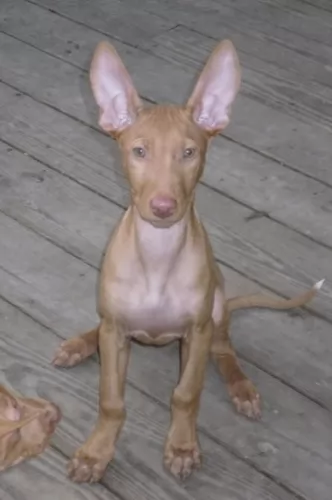 The Pharoah Hound is an elegant looking dog standing at roughly between 53 and 63cm and weighing 18 to 27kg.
The Pharoah Hound is an elegant looking dog standing at roughly between 53 and 63cm and weighing 18 to 27kg.
They are sleek dogs without any bulkiness about them and the coat is tight fitting with short smooth hair. The coat is a tan or red color, the eyes bright and the color of amber. The ears are fairly large and erect and the long tail slim with sometimes a white tip. The skin can be thin so the dog can be sensitive to the cold.
The neck of the dog is long and lean, as are the legs. An interesting aspect with this dog is that when the dog becomes excited its ears and nose become bright pink.
Pharoah Hounds are calm dogs and they can live in the city or in the countryside. They love kids and will be a wonderful playmate for them. Once he has had a lot of exercise and play, he is the kind of dog that will settle down happily with his human family for some quiet time.
Just as with any other dog, he will require training and socialization to make him obedient and better behaved.
 The Australian Stumpy Tail Cattle Dog is a hardy dog, capable of hardships that would take its toll on other dog breeds. He is a wonderful athlete and if you’ve got him working with your livestock, he’ll tirelessly perform his duties – small wonder he is so valued in the Australian cattle industry.
The Australian Stumpy Tail Cattle Dog is a hardy dog, capable of hardships that would take its toll on other dog breeds. He is a wonderful athlete and if you’ve got him working with your livestock, he’ll tirelessly perform his duties – small wonder he is so valued in the Australian cattle industry.
If you’re looking for a robust breed who will have all the energy needed to accompany you on all your adventures, he won’t disappoint. He is amazingly capable and always willing.
He’s a family dog and will be loving, devoted and loyal. Care should be taken with him around small children and other pets as he’s not to comfortable around them and he doesn’t tolerate strangers too well either. Train him and socialize him and you’ll have an amazing friend for life.
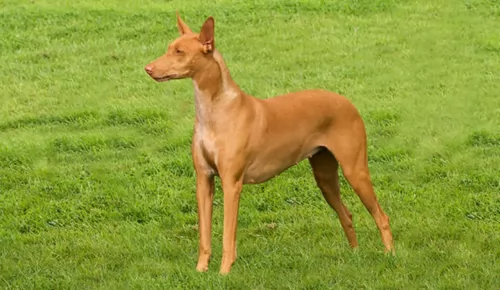 The Pharaoh Hound is quite interesting in a number of ways and he is independent, strong-willed and able to entertain and amuse himself.
The Pharaoh Hound is quite interesting in a number of ways and he is independent, strong-willed and able to entertain and amuse himself.
He loves to join in with the children and be part of their games. He’s intelligent and easily trained and he is also low maintenance.
While he’s not the most attractive dog to many people, others look at him as a true beauty. Whatever your opinion is, he will still make you a good family friend.
 The Australian Stumpy Tail Cattle Dog is regarded as being an extremely healthy breed, and the average life expectancy of this breed is at least 14 to 15 years and older.
The Australian Stumpy Tail Cattle Dog is regarded as being an extremely healthy breed, and the average life expectancy of this breed is at least 14 to 15 years and older.
They don’t suffer with many genetically inherited conditions, but they are susceptible to
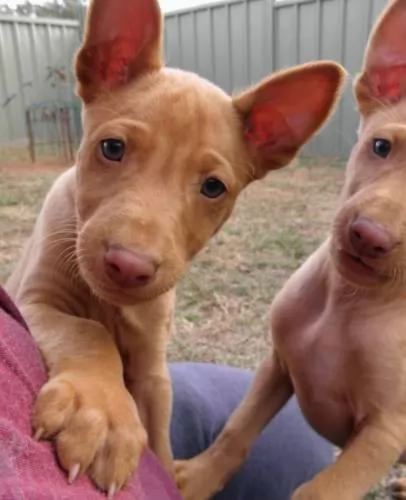 Pharaoh Hounds are uncommon outside of the Maltese Islands and with very little irresponsible breeding, these dogs are virtually free of genetic diseases. A common dog illness to look out for includes -
Pharaoh Hounds are uncommon outside of the Maltese Islands and with very little irresponsible breeding, these dogs are virtually free of genetic diseases. A common dog illness to look out for includes -
Your Pharaoh Hound can suffer from patella luxation, and in more severe cases it can be painful and even be disabling for a dog. This ailment comes about when the kneecap is dislocated from its normal position. You’ll find your dog lifting his hind leg quite a bit. Unfortunately this problem can lead to arthritis developing.
Other illnesses to look out for are bloat, cancer, skin allergies and ear infections.
 The beauty about the Australian Stumpy Tail Cattle Dog is that he is low to moderate maintenance. He will require a good weekly brushing as he can shed quite a bit when the season’s change and his new coat comes in. He is hypoallergenic.
The beauty about the Australian Stumpy Tail Cattle Dog is that he is low to moderate maintenance. He will require a good weekly brushing as he can shed quite a bit when the season’s change and his new coat comes in. He is hypoallergenic.
Australian Stumpy Tail Cattle Dog puppies will need 4 bowls of food over a 24 hour period Puppies from 6 months on can have 2 bowls a day. Speak to your vet about the best foods for your dog and ensure fresh, cool water is constantly available to your pet.
Don’t just feed your dog pellets continuously – mix in some raw meat and some cooked chicken and rice for variety and to ensure a shiny, glossy coat.
The Stumpy is a hugely energetic dog and he will become bored and frustrated if he doesn’t get plenty of exercise and games. Ball throwing, swimming, long walks and a run in the park will be important for the Stumpy that doesn’t live on a farm. Leaving him alone without exercise will lead to anti-social behaviour such as continuous barking, digging and chewing.
Take your Stumpy to the vet if you suspect health problems. Certainly, when you buy a puppy, make sure that he has all his vaccinations. There are certain health problems that are more common in the Australian Cattle dog and you want to do whatever it takes to ensure your dog steers clear of them.
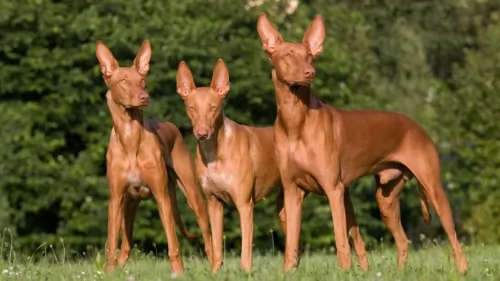 The Pharaoh Hound’s short coat is easy to groom and it will require a brushing at least twice a week just to get rid of loose hairs.
The Pharaoh Hound’s short coat is easy to groom and it will require a brushing at least twice a week just to get rid of loose hairs.
At the same time trim his nails, check inside his ears for infection and look inside his mouth for any rotting teeth.
Your Pharaoh Hound is an active, energetic dog and he will need a good dose of exercise every day. Take him with you on your walks or allow him to join you with your hikes, jogging or cycling. At home involve him in some ball games.
How much any adult dog eats will depend on a number of factors such as size of dog, age and his activity levels.
You get some excellent dog kibble these days on the market but the idea is to choose one of the high quality ones which have minerals and vitamins in them. Home-made food is also good for your pet and this should be kept simple, consistent and nutritious.
Every now and then you can add in some boiled chicken, brown rice or pasta and sweet potato, carrots and spinach to the kibble. Some raw meat added in can also be of benefit to your dog’s health.
Stay away from spicy, exotic foods and keep your dog's food easy like suggested so as to avoid digestive problems